SEO
20+ Blogging Tools to Improve Your Workflow
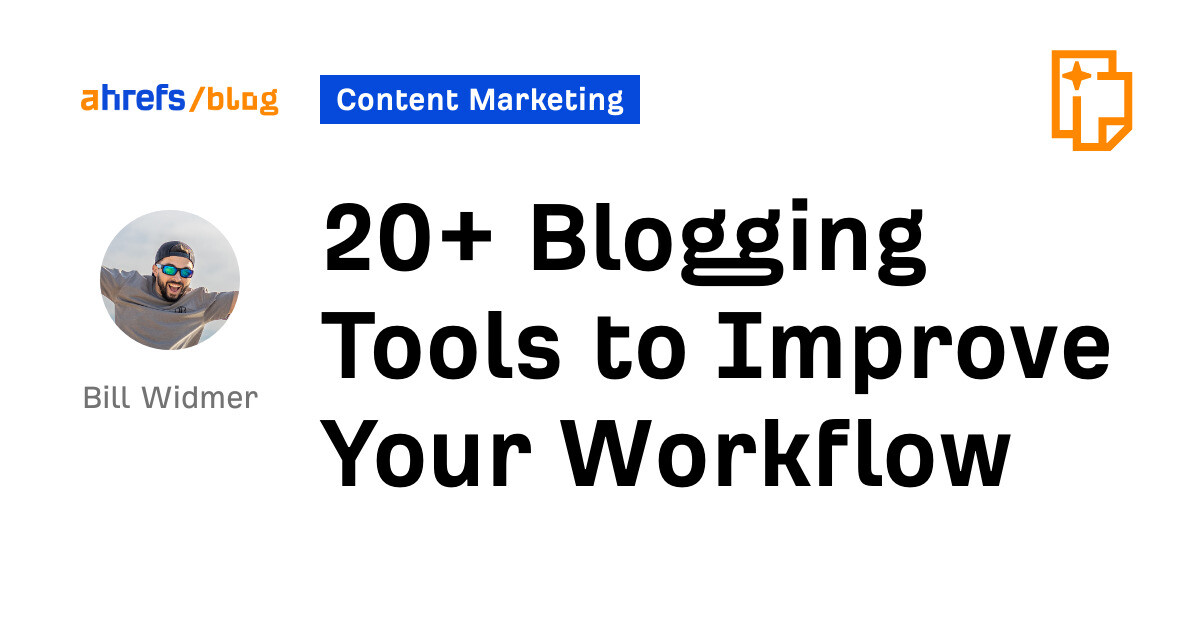
If you want to make the most of your time blogging, choose the right tools because they’ll save you a lot of money and effort.
But there are a lot of tools out there—and not all of them are worth it.
Well, I’ve been blogging for over a decade and have used hundreds of tools in that time. To help you sort the wheat from the chaff, I’ll list all the tools I’ve used to grow several blogs to a six-figure income—and what each of them is useful for.
Just want the best blogging tool stack? Here are my 10 most-used tools for blogging:
- WordPress – Best content management system (CMS) to manage your blog.
- Google Docs – Best word document editor to collaborate with your team.
- Wordable – Easily upload your articles from Google Docs to WordPress with one click.
- Ahrefs – Best all-around SEO tool for ranking high on Google.
- Notion – Best task management and content planning software.
- Google Search Console – Best tool for making informed SEO decisions.
- Canva – Best graphic creation tool.
- Snagit – Best screenshot capture and editing tool.
- Loom – Best screen recording tool.
- ConvertKit – Best email marketing software.
Want more? Keep reading.
Let’s kick things off with a list of tools you can use to research, write, edit, and publish your blog posts.
WordPress
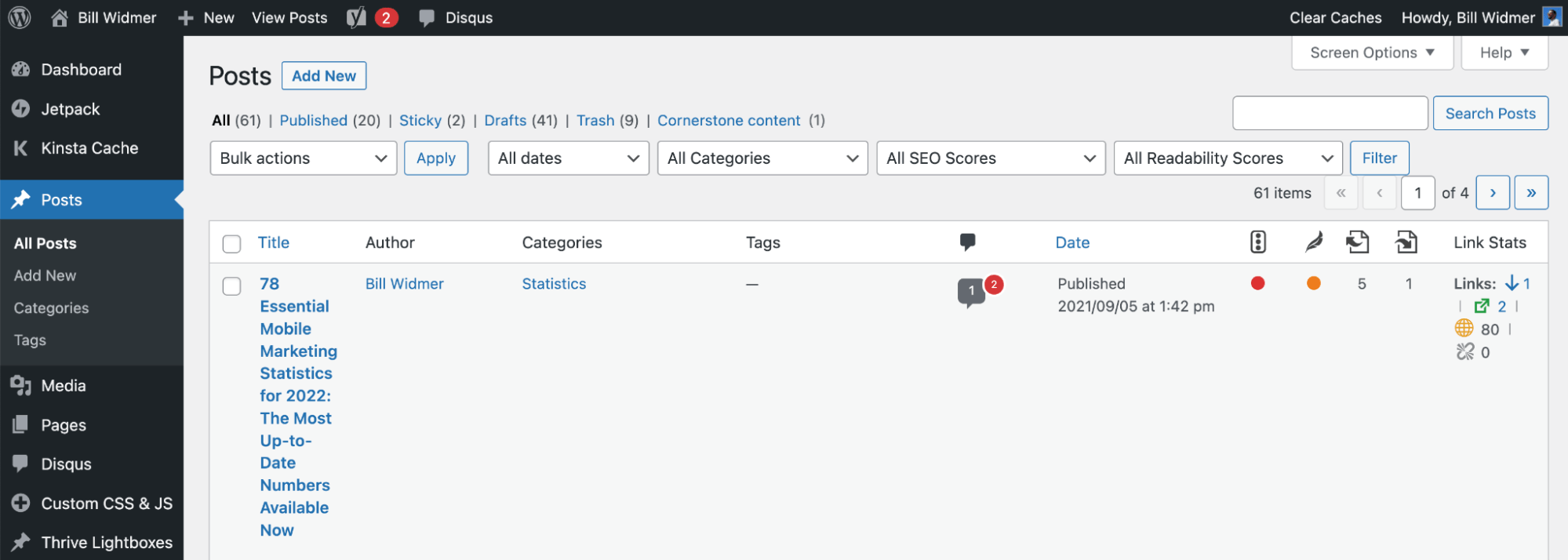
What it is: A content management system (CMS) to build your website and publish blog posts.
Why I love it: It is the most robust, SEO-friendly CMS on the market. Because it’s open source and so popular, you can do almost anything with WordPress with the right plugins or a good web developer. I’ve been using it since I started my first blog at 15. It’s not the easiest blogging tool for beginners, but it’s much more powerful than “beginner-friendly” website editors like Wix or Squarespace once you learn how to use it.
Price: Free.
Google Docs

What it is: A document editor.
Why I love it: Google Docs is an easy-to-use free document editor that makes collaborating with writers and editors a breeze. I’ve been using it to write my blog articles for over 10 years. It just works.
Price: Free.
Wordable
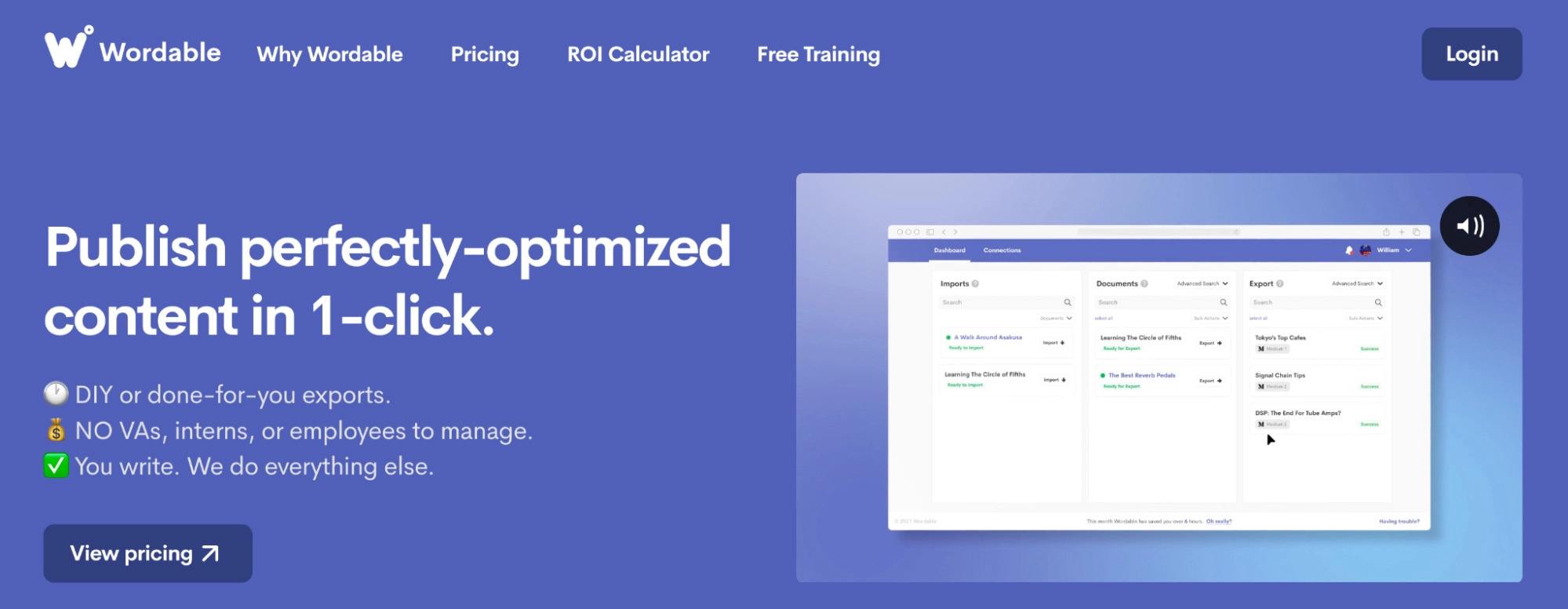
What it does: Uploads articles from Google Docs to WordPress in one click.
Why I love it: Google Docs has hidden code that’s brought over when you copy-paste content to WordPress. Wordable fixes that by uploading the document to WordPress while keeping the formatting but removing the extra code. It also cleans up and optimizes your images.
Price: Free up to five exports per month (then $50/month).
CoSchedule Headline Studio
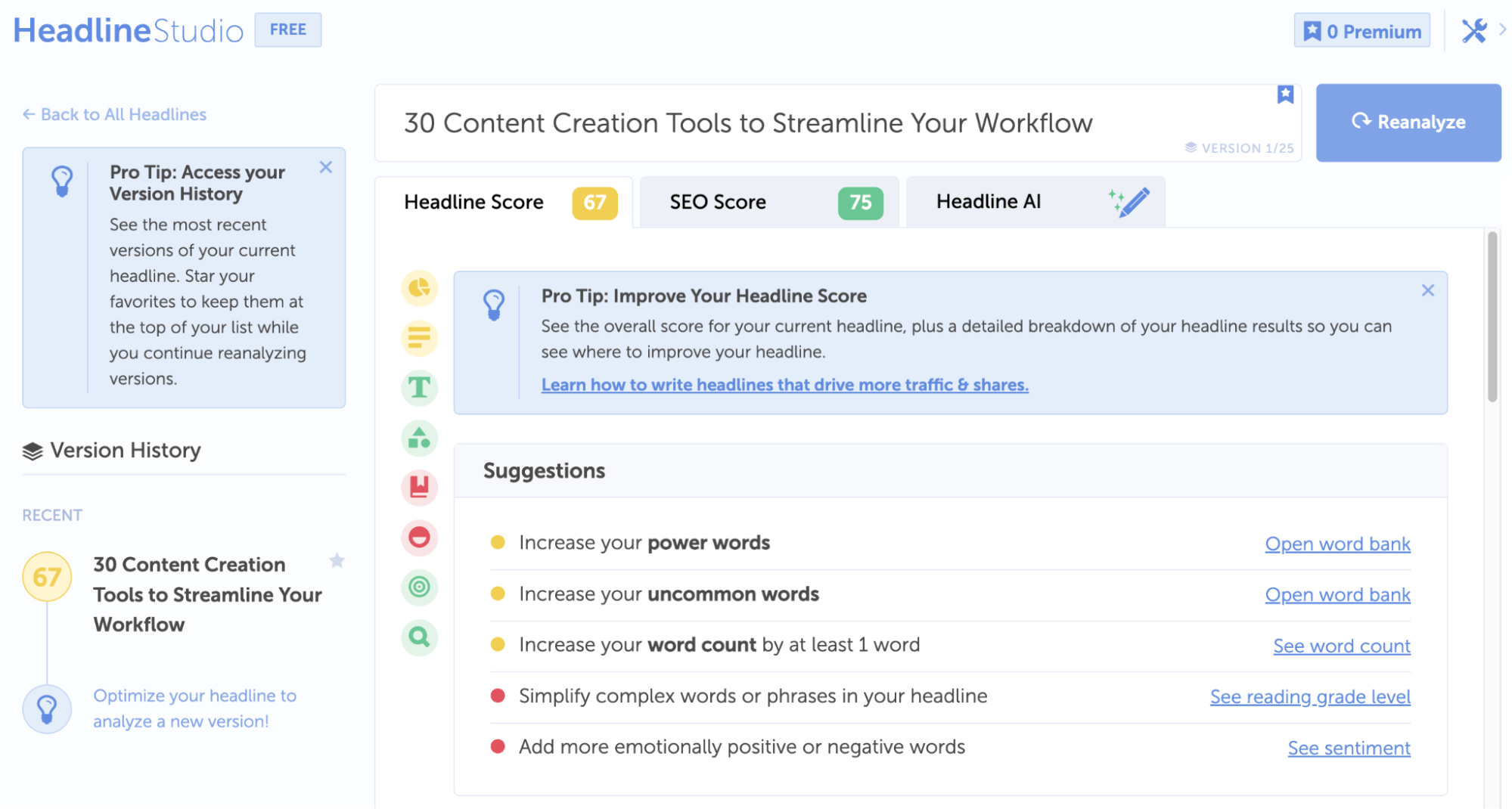
What it does: Scores your headlines clickability and SEO.
Why I love it: It helps me write killer headlines—which is important for both clickability and SEO. Better headlines mean more clicks in the SERPs which, in turn, can help your content rank higher on Google. The tool gives you ideas of power words and uncommon words to use to make your headline more interesting, and its AI can write and suggest headlines for you.
Price: Free ($19/month or $99/year for premium).
Grammarly
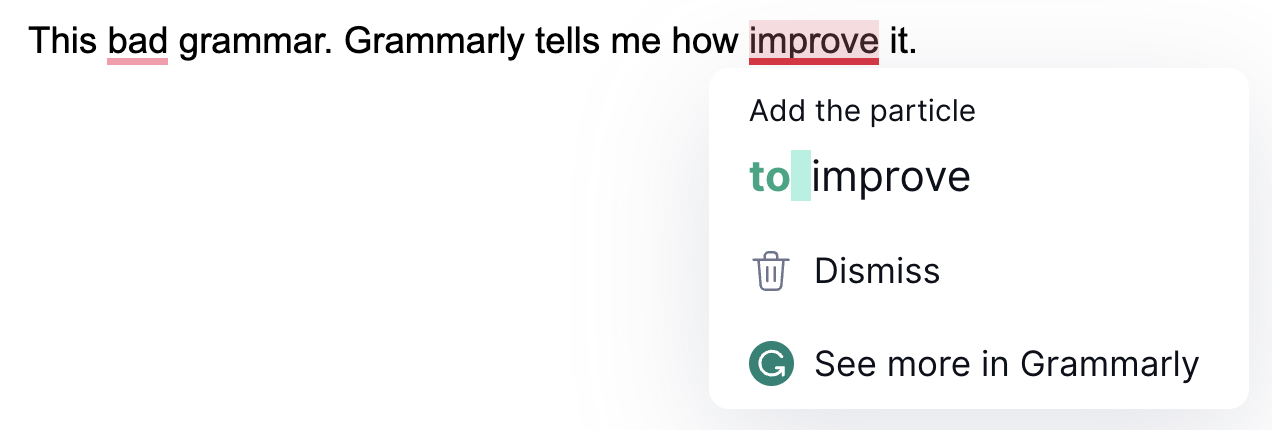
What it does: Makes suggestions to improve your writing and fixes grammar and spelling mistakes.
Why I love it: Sometimes when you’re in the flow of writing, the words just pour out of you—and you don’t want to interrupt that flow by fixing typos or grammar mistakes. I use Grammarly post-draft to fix my mistakes after the bulk of the article is finished. It’s also compatible with Google Docs and WordPress if you get the Grammarly browser plugin, which is nice.
Price: Free.
ChatGPT
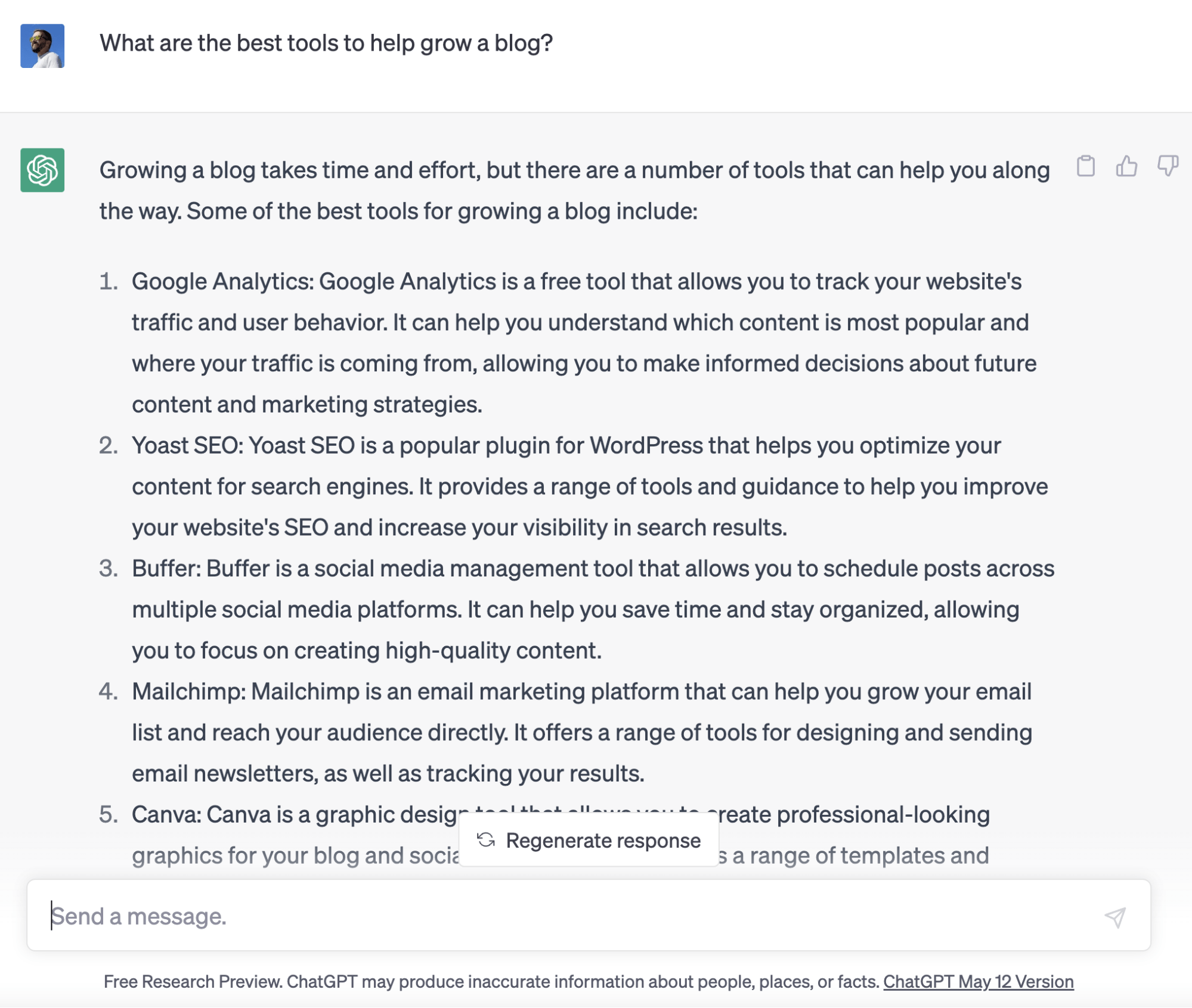
What it is: An AI chatbot.
Why I love it: I use ChatGPT for researching and outlining a lot of my content. It can help you identify topics or ideas you didn’t think about in your initial content outline. I have also started playing with it to improve my content and my life in general, such as using it to help me come up with road trip itineraries for specific needs—like finding the best routes based on weather and areas with free camping—then turn that trip into a blog post and social media videos.
Price: Free ($20/month for premium access).
Hemingway App
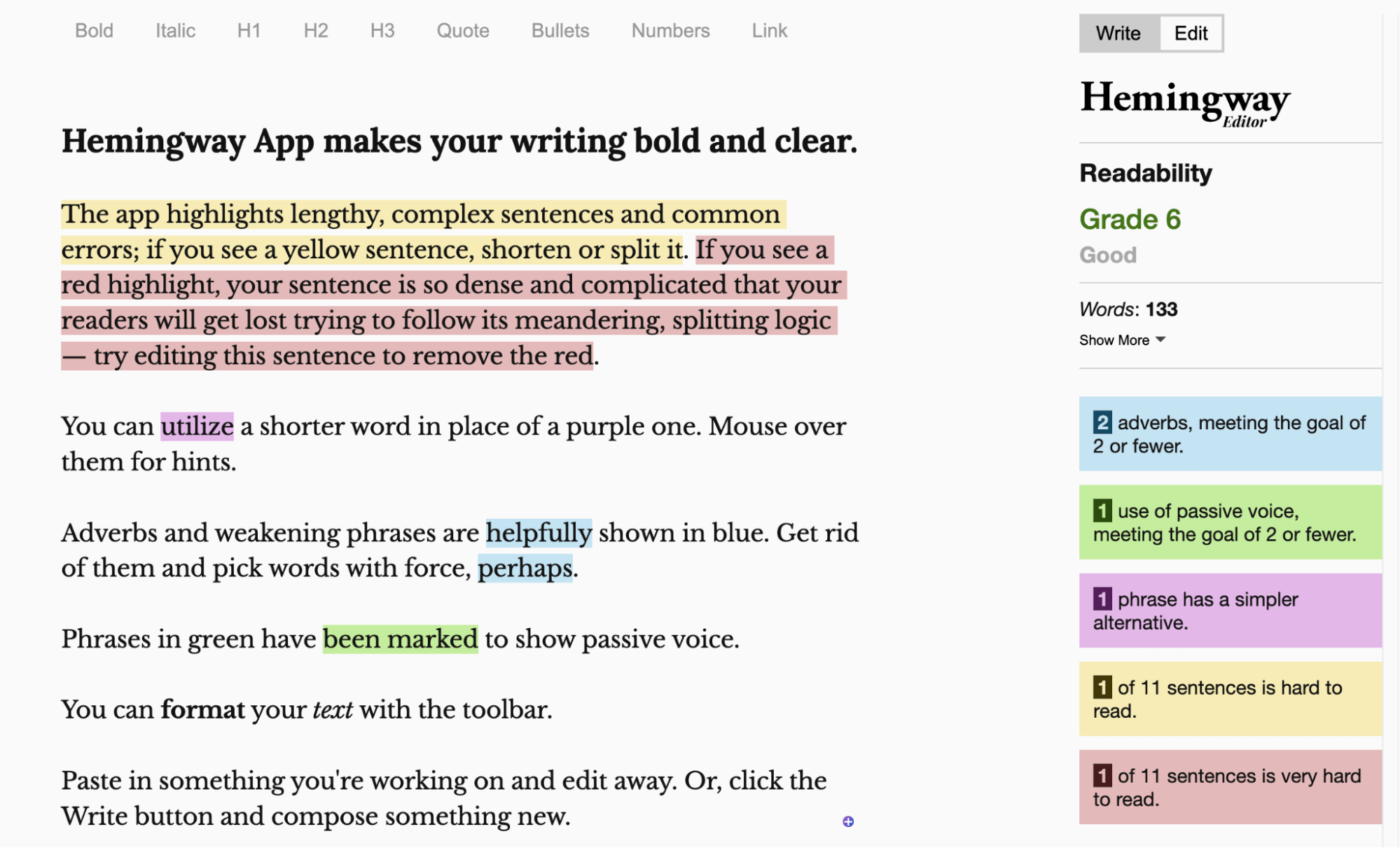
What it is: A text editor that grades your writing using the Flesch-Kincaid Grade Level.
Why I love it: As someone who performs and writes about fairly complex SEO tasks on a near-daily basis, it can be hard to know if my writing is easy to understand for the complete beginner. While the Hemingway App won’t necessarily help me break down these complex tasks, it will tell me if my writing is overly complex from a readability standpoint. If it is, I can simplify things more so that nearly anyone can read it. It’s up to me to make sure it still makes sense, though.
Price: Free.
Next up, let’s look at tools to help you create a content calendar and keep your content organized.
Notion
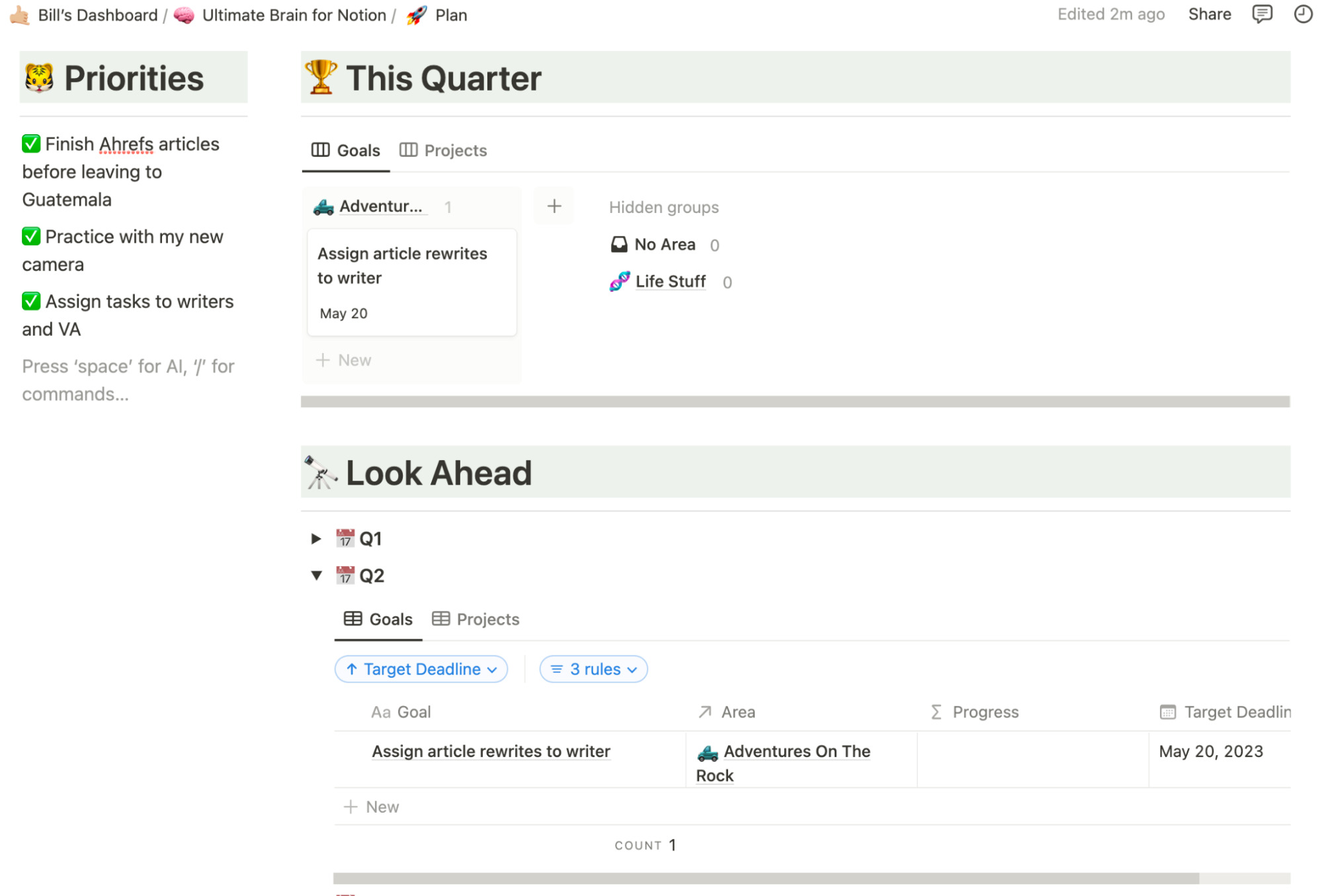
What it is: A productivity software.
Why I love it: Notion is one of the coolest software I’ve ever used. You can customize it to do almost anything: manage your to-do list, plan a content calendar, collaborate with your team, and much more. I use it to keep track of my projects and goals (both personal and business), plan out my content, journal, take notes about new things I’m learning, and more. I use Thomas Frank’s Ultimate Brain template, which has a steep learning curve but totally transformed how I plan my life and business.
Price: Free (premium plans start at $8/month).
Slack
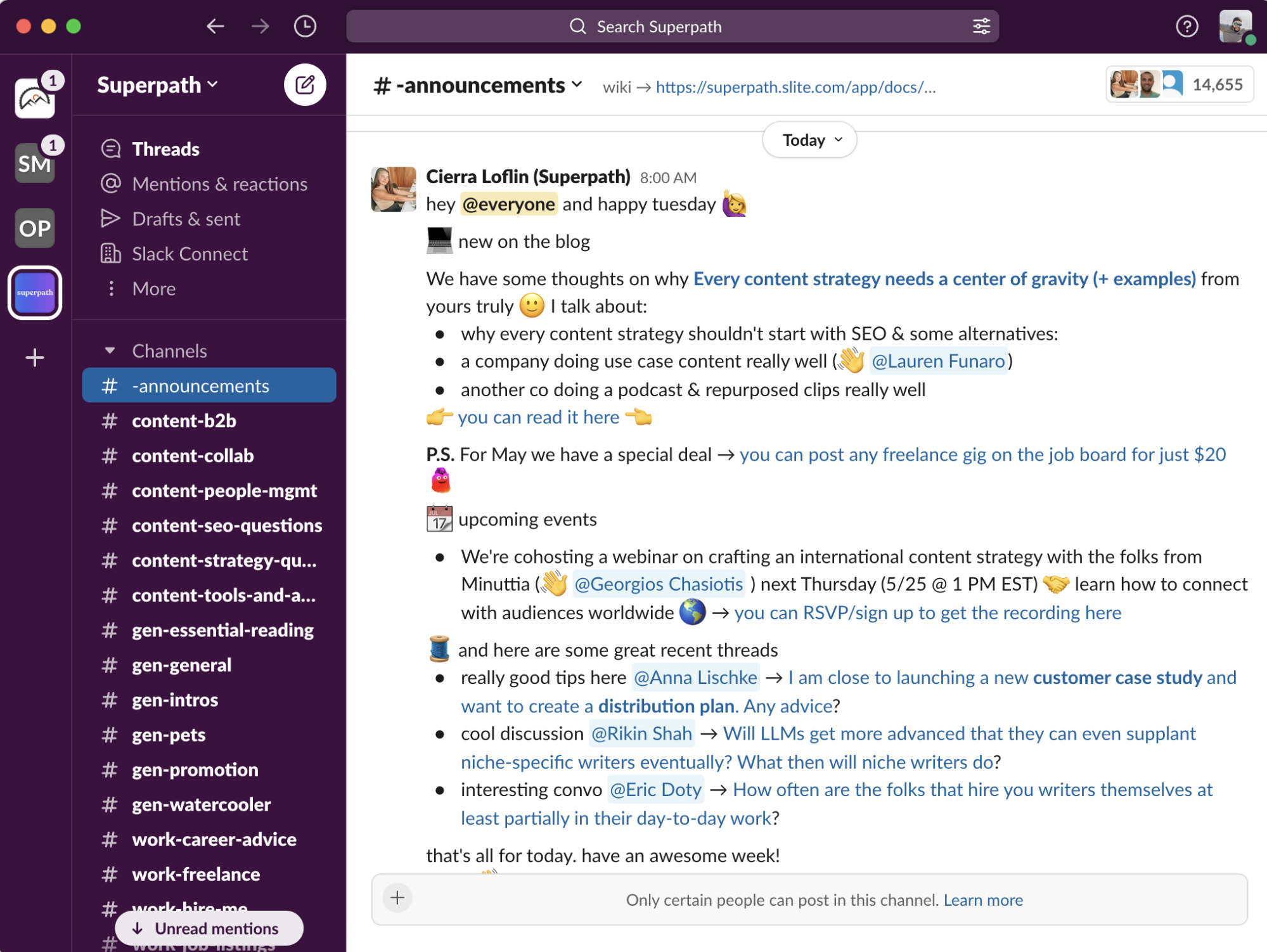
What it is: A messaging app.
Why I love it: I used to use Slack to stay in touch with my team. However, now that I use Notion, we mostly just communicate via that app. Now, I use Slack to join communities with other bloggers and content marketers and keep in touch with masterminds I’ve met over the years. Check out some of these Slack communities for SEOs.
Price: Free (premium plans start at $7.25/month).
Google Analytics
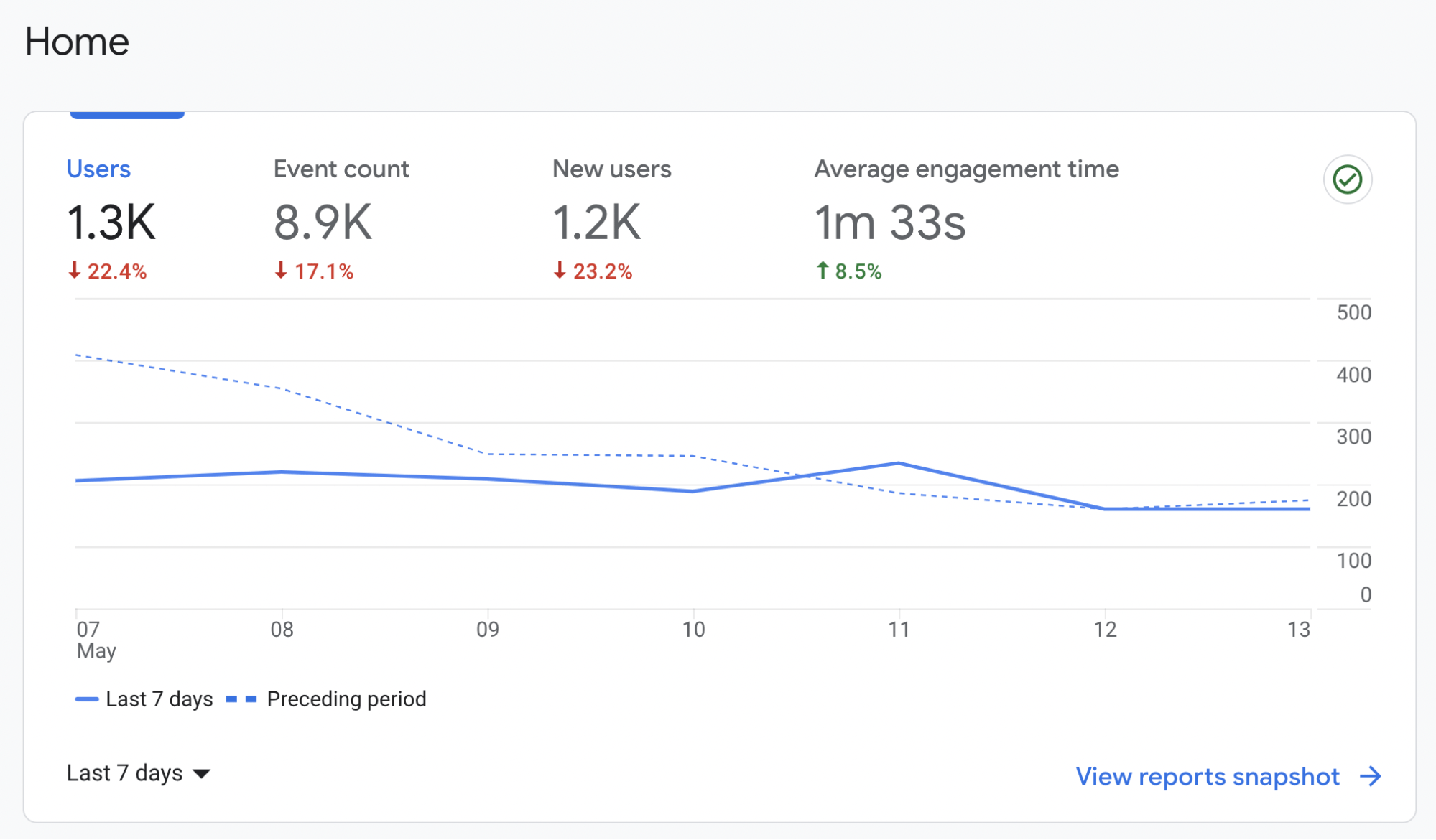
What it is: An analytics dashboard for your website.
Why I love it: Seeing analytics data (e.g., what pages people are visiting on your site, how long they’re staying on your site, and where that traffic came from) is important to make informed decisions about what types of content to produce and where to promote your content. I check the analytics at least once a week to see which pages are performing best.
Price: Free.
Google Trends
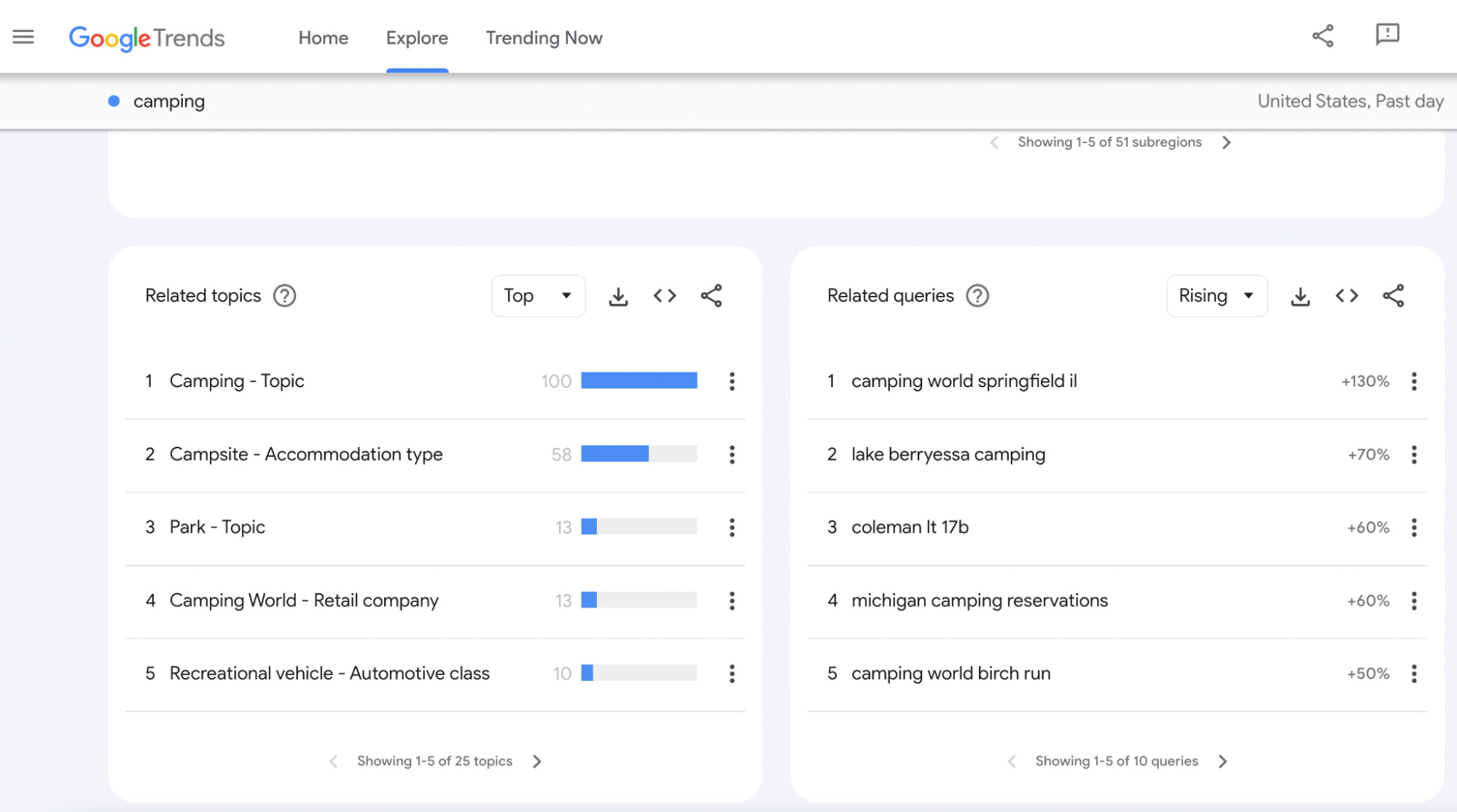
What it does: Shows search trends for topics over time.
Why I love it: It’s super useful for finding trending and breakout topics. For example, I was recently looking for new topics for my camping website and found that searches for “lake berryessa camping” have risen 70% in the last 12 months.
Price: Free.
Search engine optimization and blogging are two peas in a pod. If you want to grow your blog organically, you need to learn SEO. Here are a few tools to help you rank higher on Google:
Ahrefs
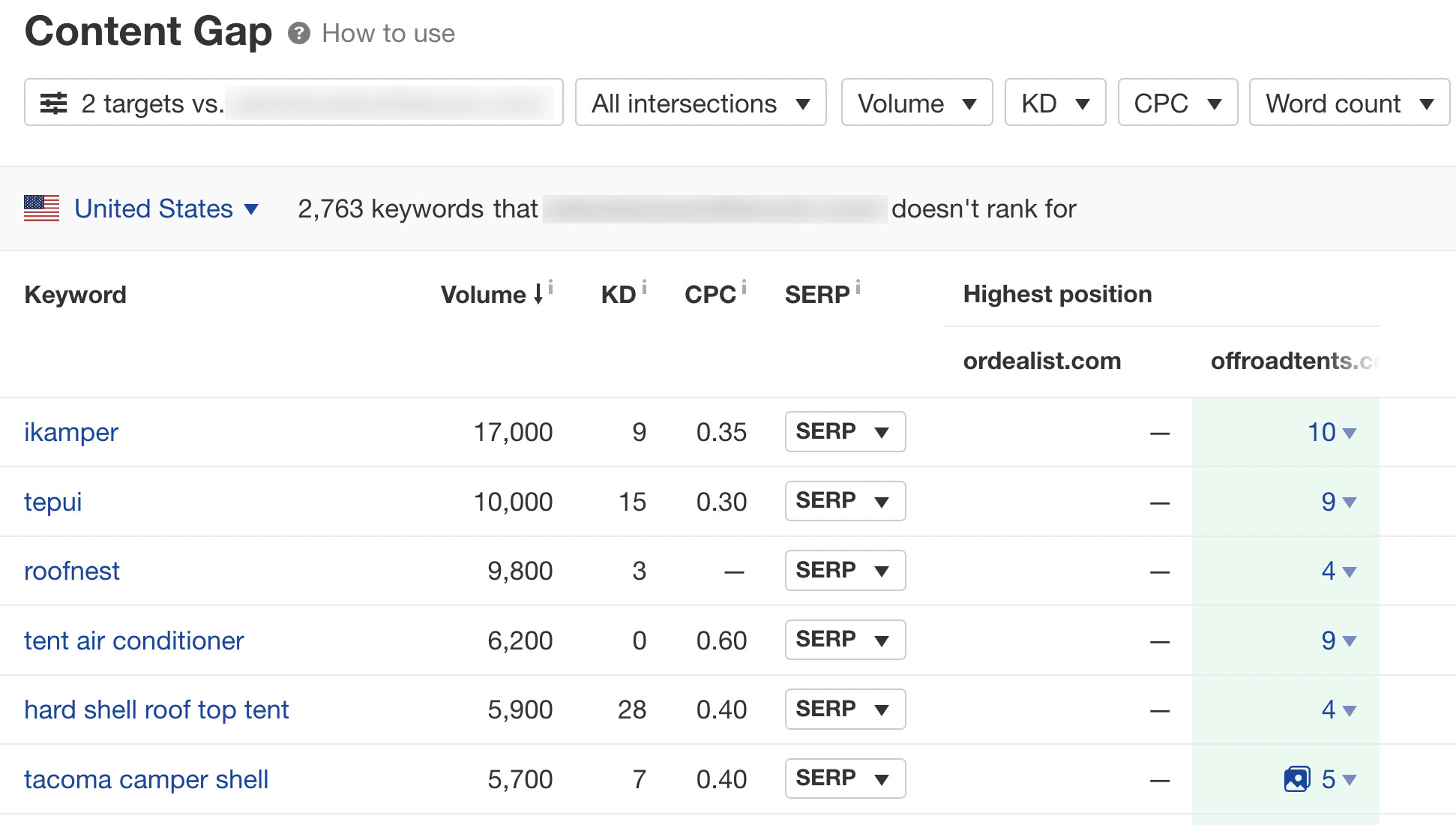
What it is: An all-in-one SEO tool suite.
Why I love it: I use Ahrefs for a lot of things. For me, it’s been most useful for keyword research and finding backlink opportunities. My most-used feature of Ahrefs is the Content Gap report within the Site Explorer tool, as shown in the screenshot above. I like to spy on my competitors’ keywords to see what they’re ranking for that I’m not. Of course, that’s just scratching the surface of what Ahrefs can do.
Price: $99+ per month (free tools available).
SurferSEO
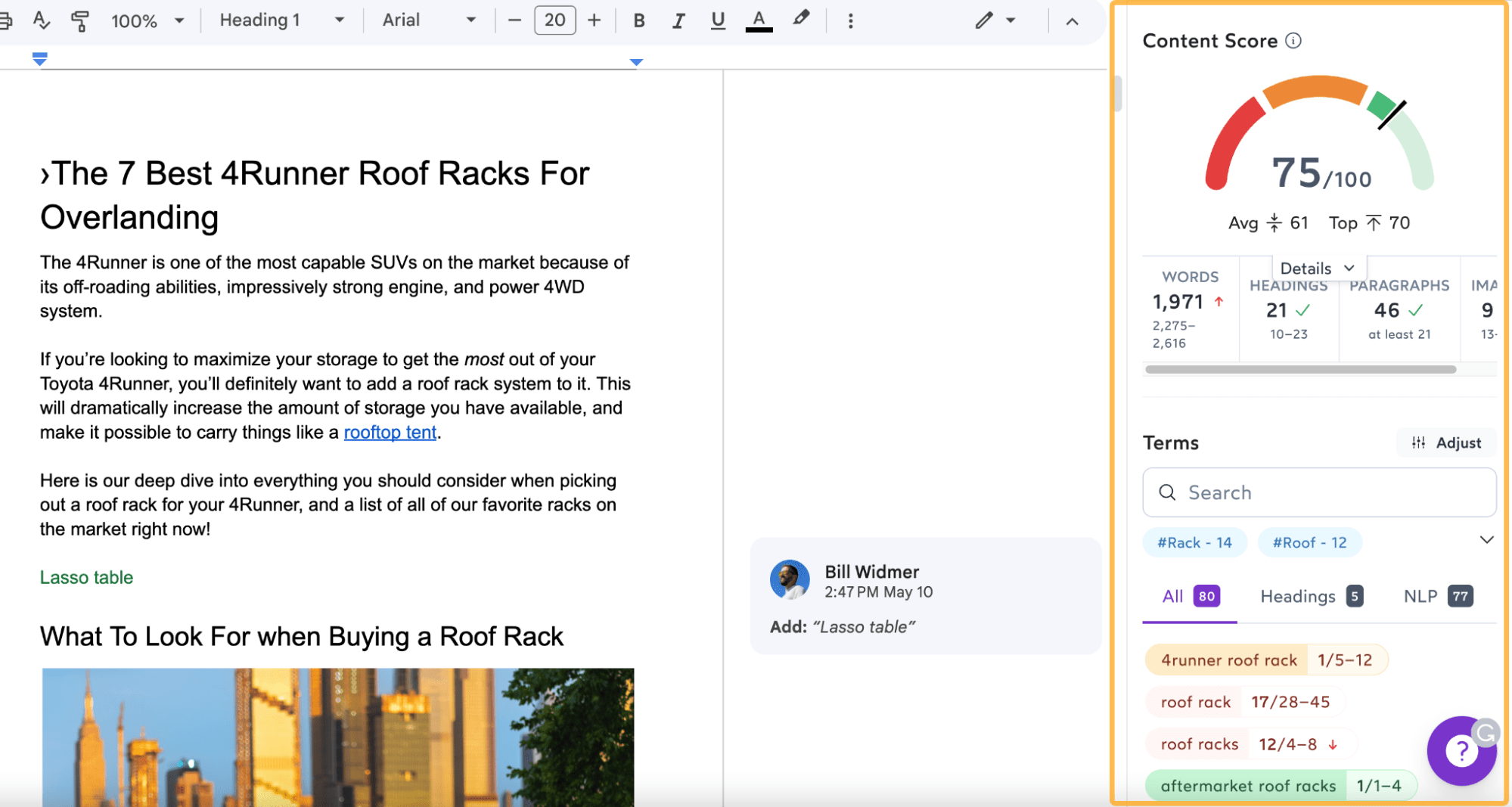
What it is: A software that analyzes current Google search results to score your content based on how well optimized it is compared to competing results.
Why I love it: I use SurferSEO to help me outline my content in a way that is more likely to rank well on Google. It has a content editor with a content score system that goes from 0 to 100 to grade how well optimized your content is for a given keyword (100 being the most well-optimized article). It also has a Chrome extension that lets you use it in combination with Google Docs.
Price: $49+/month (depending on tier).
Yoast SEO
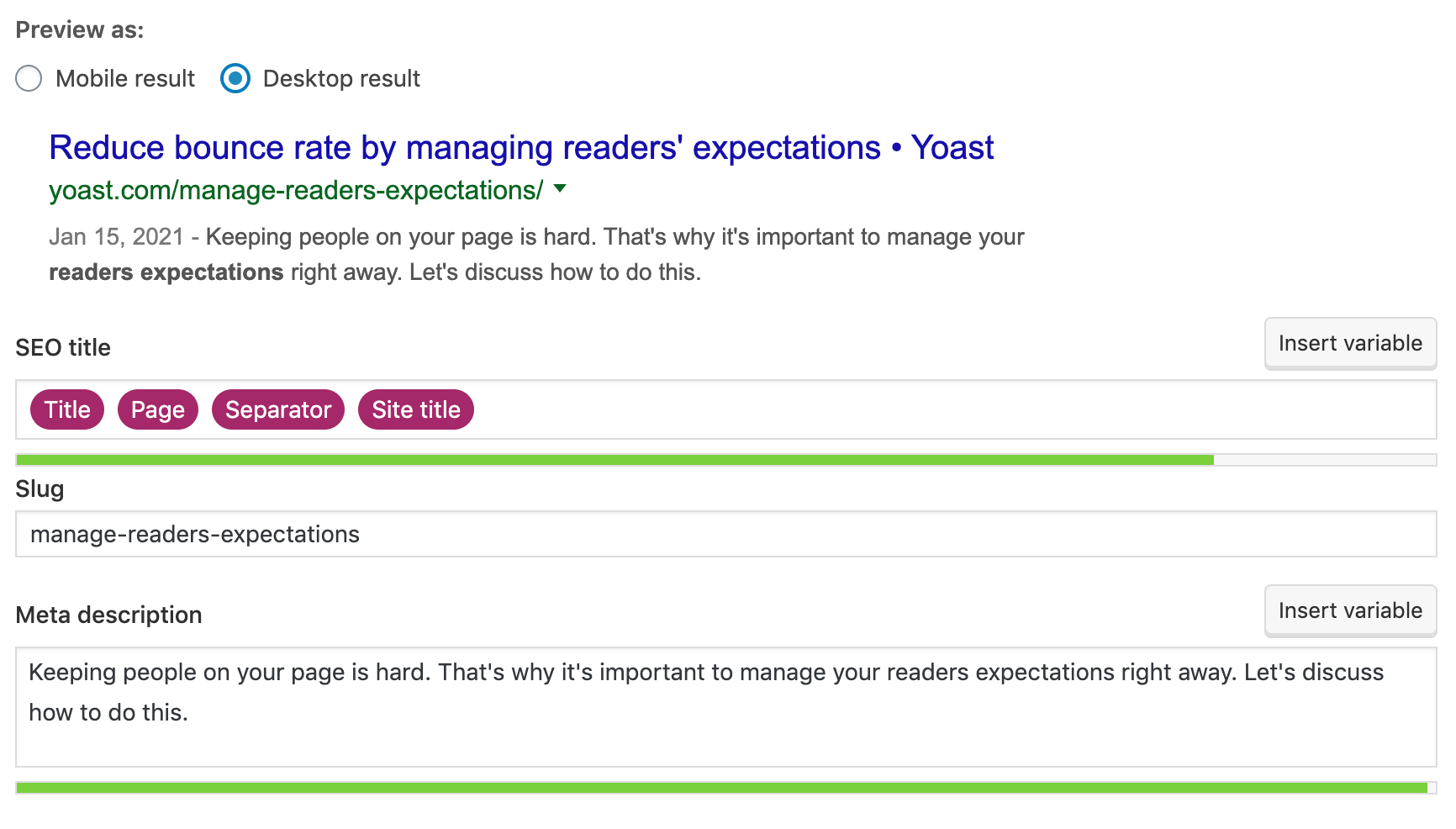
What it is: A WordPress plugin that helps you better optimize your pages for search engines.
Why I love it: Yoast makes it easy to set your page’s meta tags, add robots.txt and sitemap files to help Google more easily crawl your site, and quickly see what pages aren’t optimized for search.
Price: Free ($99/year for premium).
Google Search Console
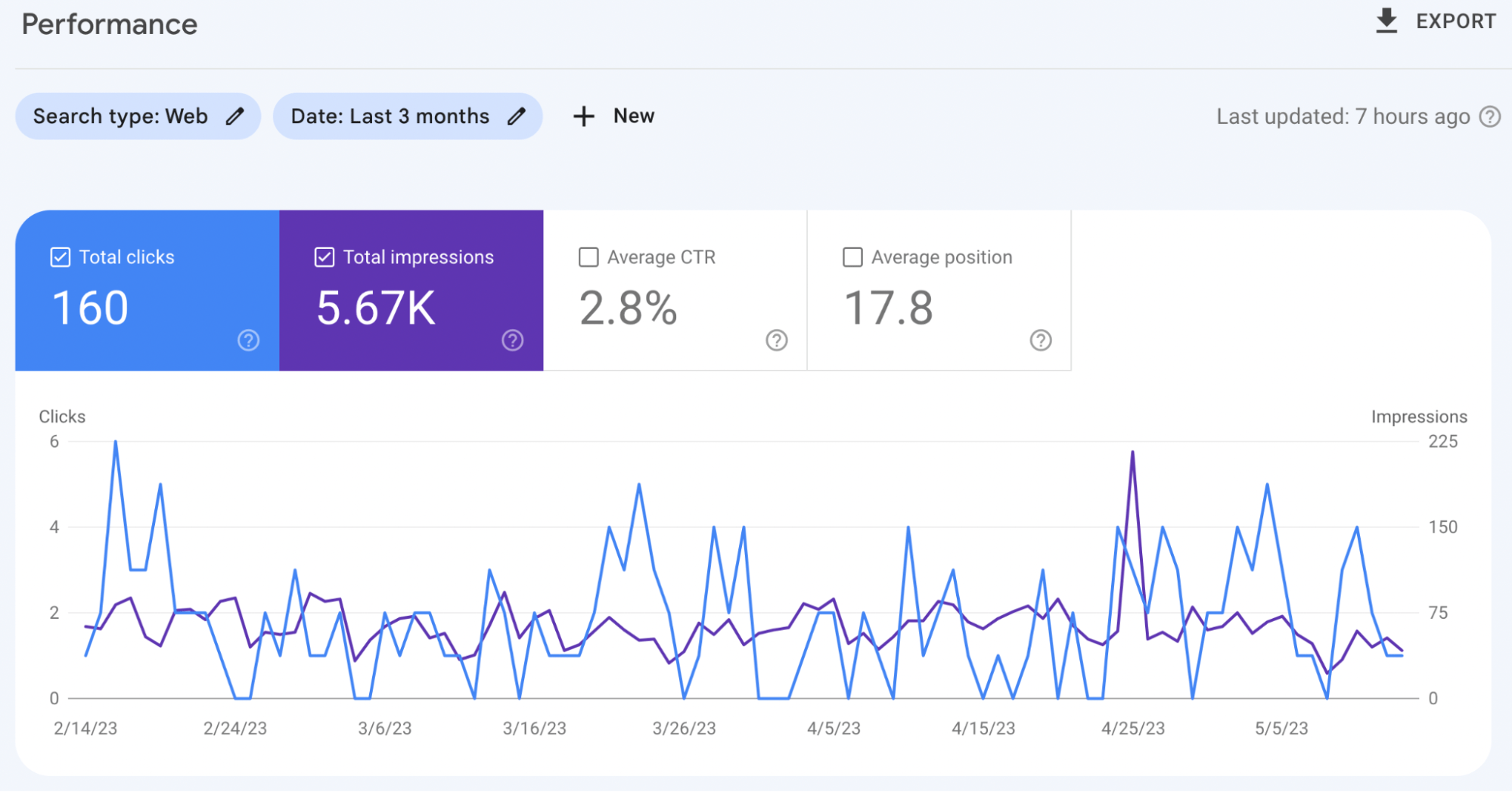
What it is: A tool to monitor and troubleshoot your website’s appearance in search results.
Why I love it: I use Google Search Console to help me find pages that are losing traction on the SERPs over time. Just go to the “Performance” report; then for the date, compare the last three months to the previous three months (or longer). Anything that’s dropped in traffic should be considered for a content refresh. I also use it to keep tabs on my site’s performance in general and see if it has any issues like not passing Core Web Vitals.
Price: Free.
AnswerThePublic
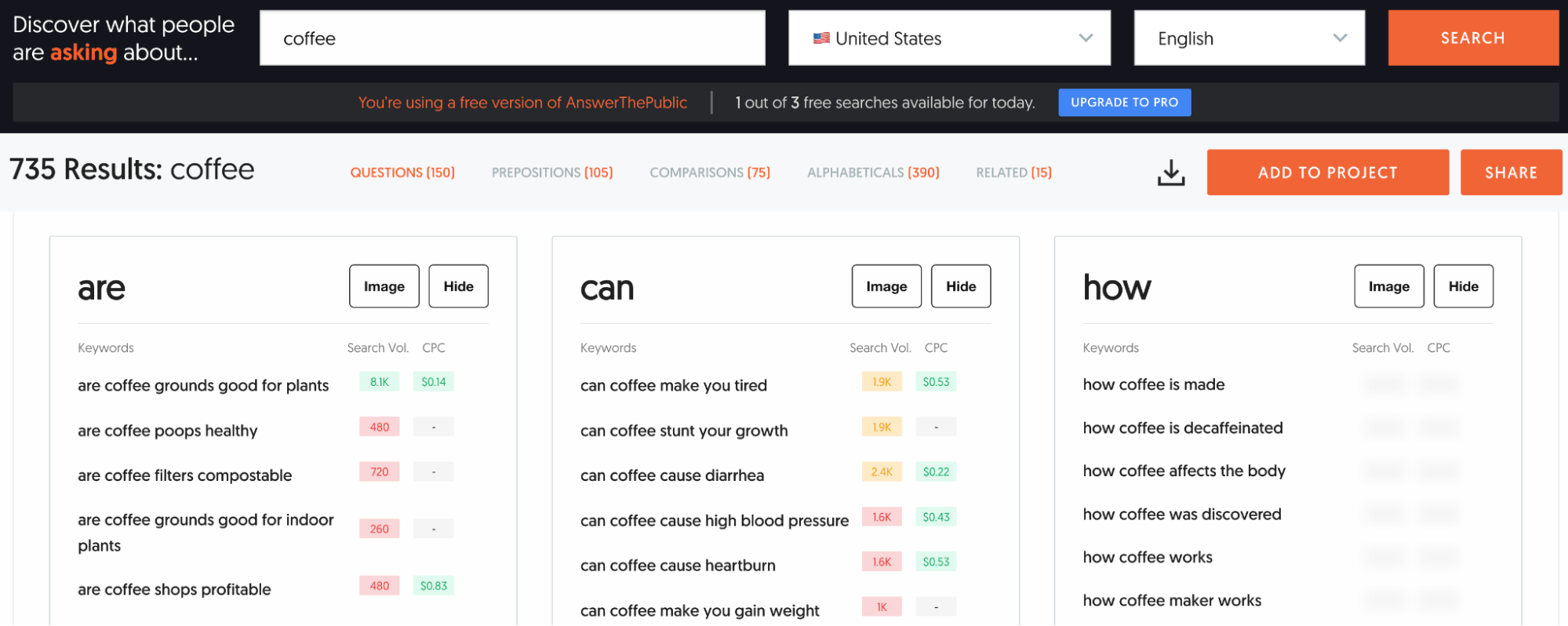
What it is: A software that finds common questions people ask on Google that are relevant to a given search query.
Why I love it: I use ATP to ensure I’m addressing all the common frequently asked questions people have around a given topic when I’m writing an article. It also helps me to show up as the answer for People Also Ask questions on Google.
Price: Free (premium plans start at $9 per month).
To The Web Title Tag Preview Tool

What it is: A tool to see at a glance if your meta title and description are too short, too long, or just right.
Why I love it: I use it to make sure my title tags won’t be truncated (cut off) in the Google search results. If your title tag is too long (or too short), you can see it with this tool and adjust it accordingly.
Price: Free.
Let’s face it—there are only 24 hours in a day. You don’t want to waste your time manually sharing every blog post on social media or sending individual emails, do you? These tools will automate some of those time-consuming tasks for you.
Buffer
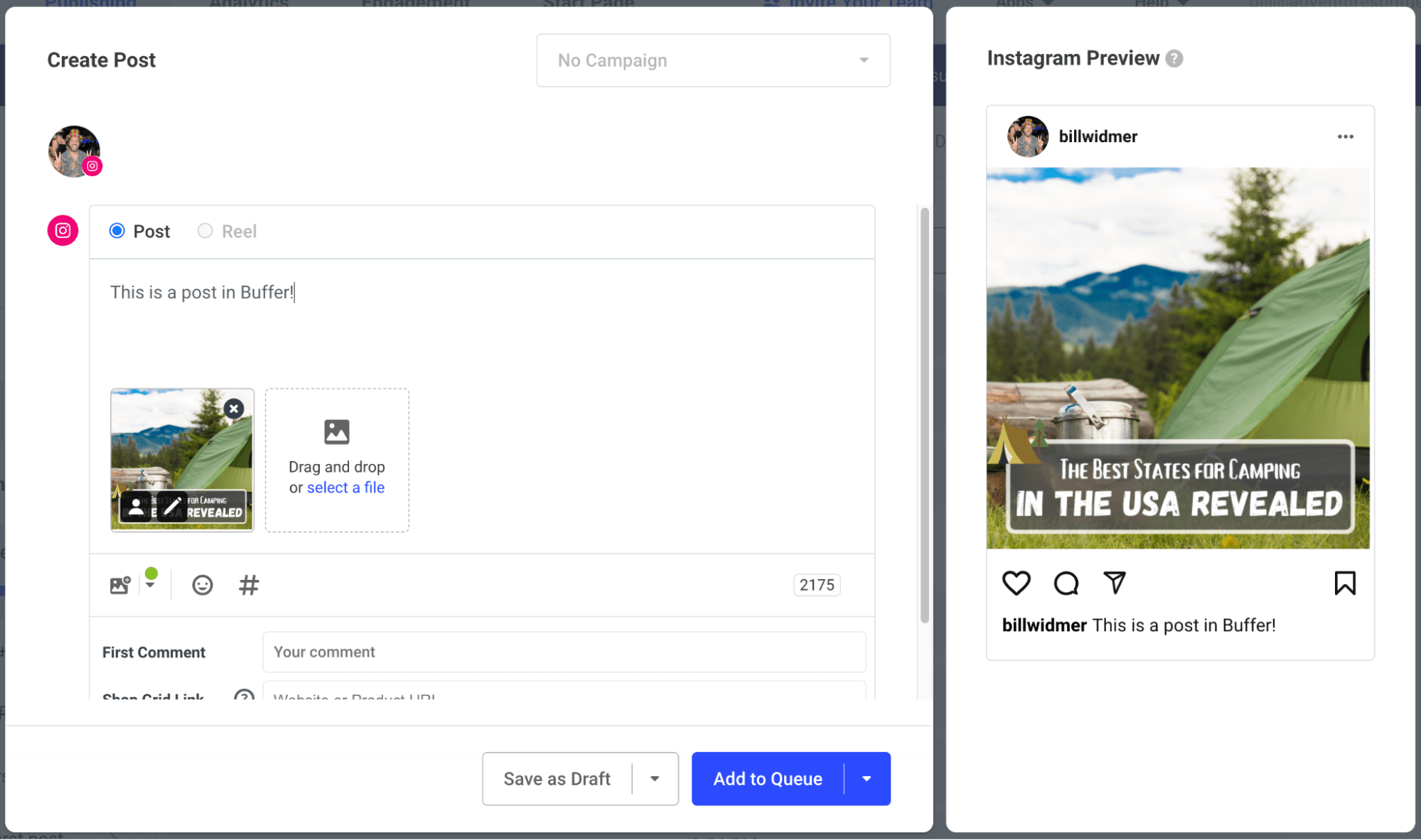
What it is: A social media scheduling tool.
Why I love it: Posting the same thing to four different social media channels is both a pain and a waste of time. Buffer makes it so that I can push updates across channels from one dashboard and see how they’re performing without logging in and posting from each channel separately. I also hired a freelancer and trained her to schedule all my blog posts to all my channels on Buffer for a double-whammy of time-saving awesomeness.
Price: Free (premium plans start at $6/month per channel).
ConvertKit
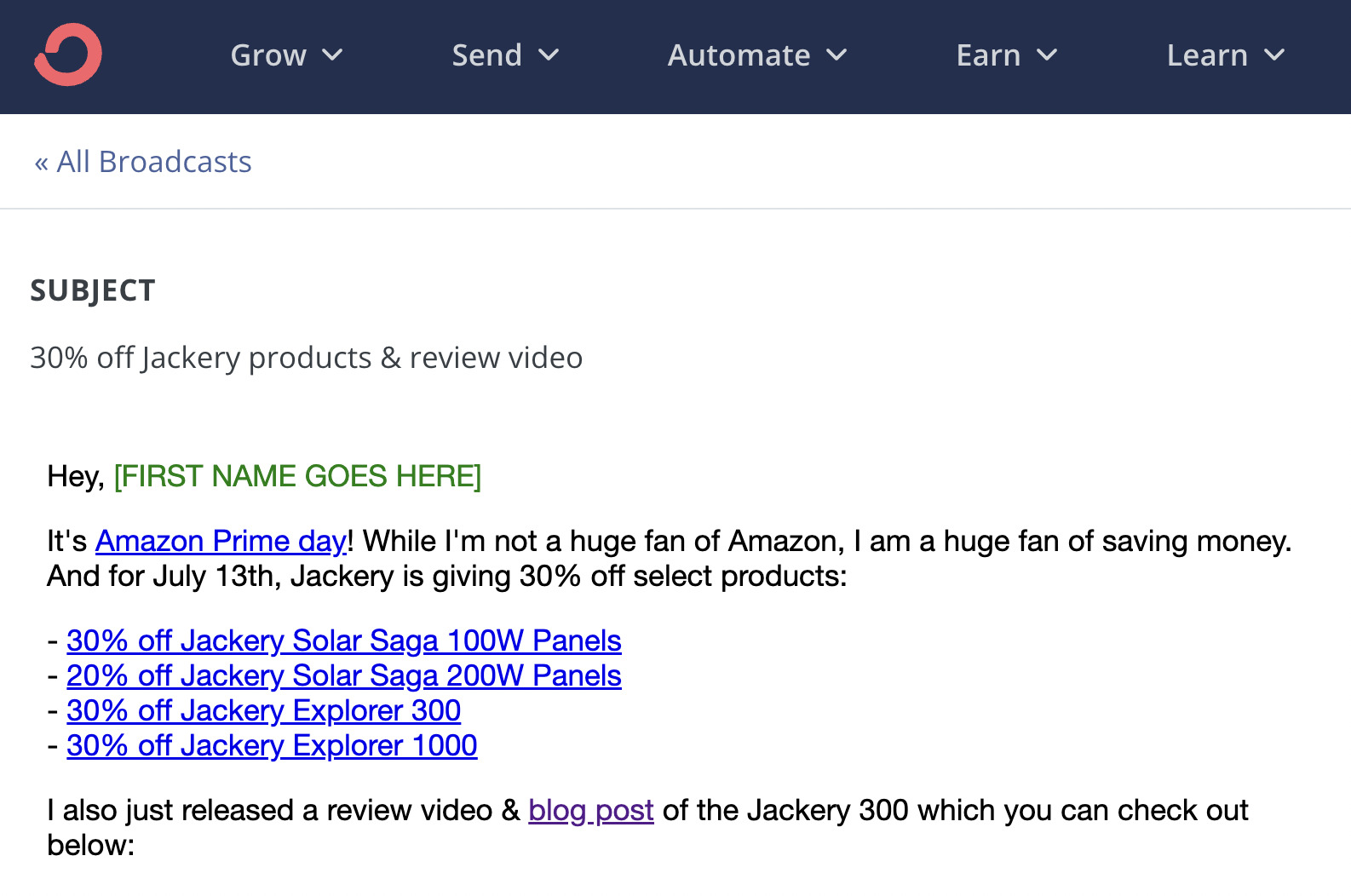
What it is: An email newsletter automation tool.
Why I love it: I love the fact that ConvertKit is extremely intuitive and easy to use. I’ve tried Mailchimp, BirdSend, and a handful of other email marketing tools—none of them were as simple as ConvertKit. I also love that its powerful automation features allow me to set up custom email drip campaigns that are tailored to individual segments of my audience, which increases engagement rates by allowing me to create highly personalized emails.
Price: Free up to 300 subscribers (then starts at $9/month).
Zapier

What it is: An automation API.
Why I love it: What’s not to love about automation? I use Zapier to send me an email when someone fills out one of my Typeforms to inquire about my services, but you can do a lot with it. Check out its list of use-case examples to get ideas.
Price: Free up to 100 tasks/month (starts at $19.99/month for paid plans).
Last but not least, I have a suite of tools I use to create images, videos, screenshots, and more.
Canva
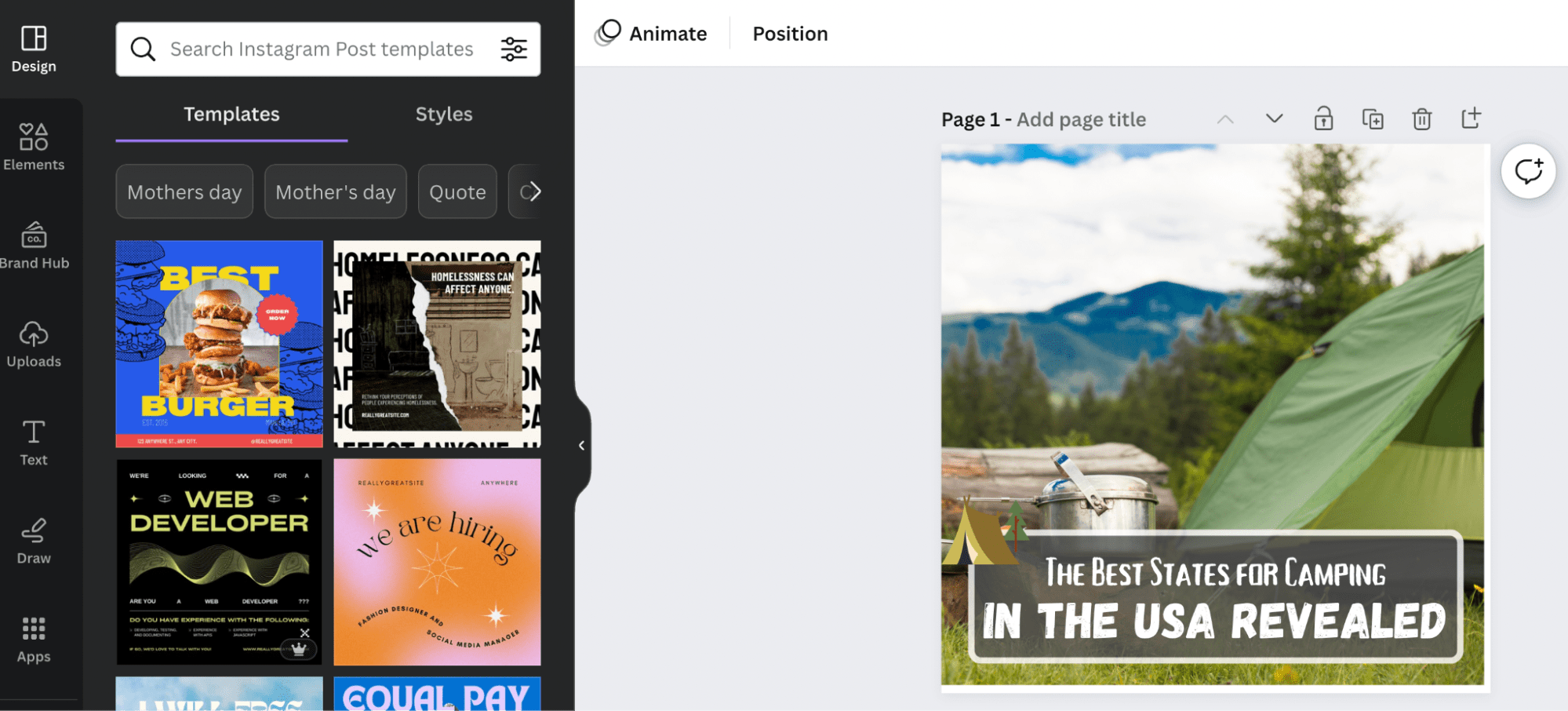
What it is: A drag-and-drop image editor.
Why I love it: I use Canva to create featured images and social media share images for all of my blog posts. It’s incredibly easy and intuitive for a non-designer like myself to create high-quality graphics that look professionally made. It also has an AI photo editor to automate—or at least assist in—the process.
Price: Free ($12.99/month or $119.99/year for premium).
Snagit
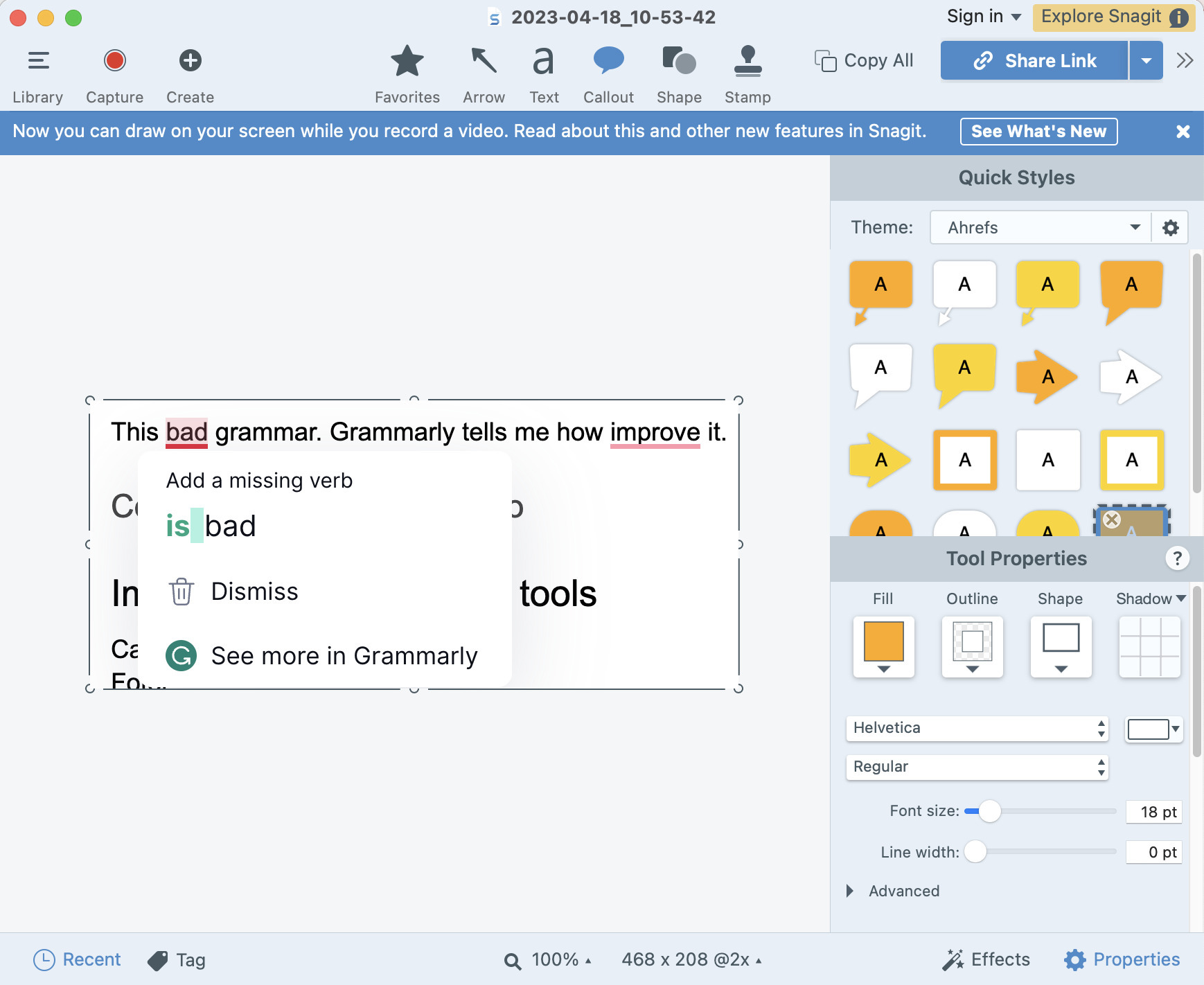
What it is: A screen capturing and editing tool.
Why I love it: I’ve used a lot of screen capture tools, and this one has been by far the best. We use it at Ahrefs for all of our screen captures to show you how to use our tools. I also use it in my blogs to add extra information when needed and in my standard operating procedures for freelancers.
Price: $62.99 (free trial available).
Loom
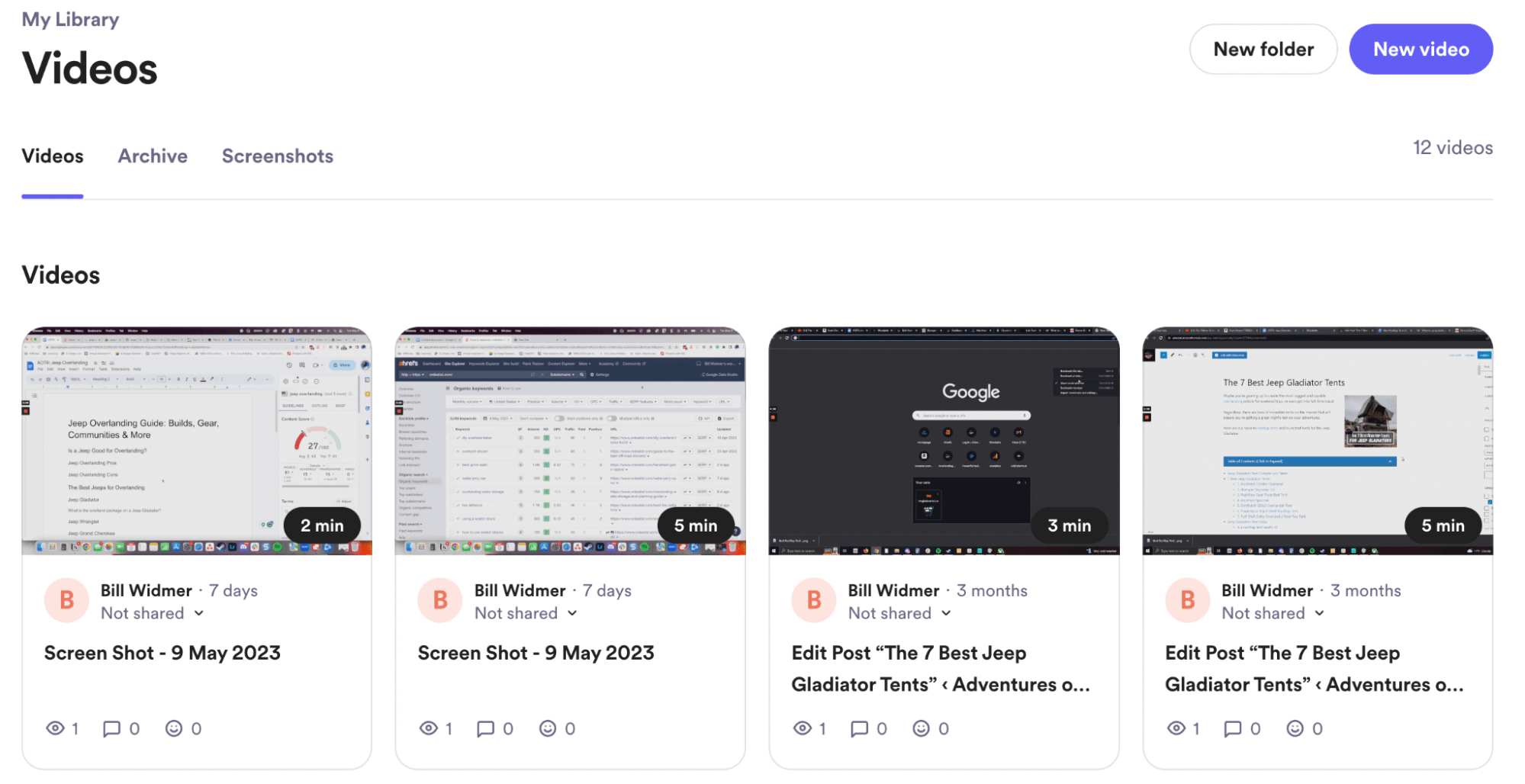
What it is: A screen recording tool.
Why I love it: It’s simply the easiest way to record your screen and share it with your team, blog readers, or whoever. I use it to record tutorials, how-tos, and other videos to help my employees learn SOPs and to show exactly how to do certain tasks in my YouTube videos.
Price: Free (unlimited video starts at $8/month).
Descript
What it is: An audio and video editor.
Why I love it: Descript is much more powerful than a simple audio or video editor—it has cutting-edge AI software that allows you to do things like “greenscreen” any background, remove all the “ums” and “uhs” from your audio, and easily rearrange clips. It even has an AI tool that can clone your voice in case you forget to say something. Pretty cool if you ask me.
Price: Free (paid plans start at $12/month).
Fotor AI Image Generator
What it is: An AI image generator. Duh.
Why I love it: It’s fun to create totally unique custom images for your blog posts based on text prompts using AI. While it’s not great yet, it’s come a long way and soon will be able to create photo-realistic images to use in your content. I also use it to occasionally give me fun things to share on Instagram.
Price: Free ($12.99/month or $119.99/year for premium).
Unsplash

What it is: A free-to-use, high-quality stock image library.
Why I love it: I use Unsplash to find high-quality photos to use in the Canva graphics I create for my blog posts—such as featured images and photos to visually show what I’m discussing in the text. I used an image of a truck on my page about truck driver statistics, for example.
Price: Free.
Final thoughts
Having the right tools for blogging can help you produce better content faster, get more out of your blog articles, and grow at an exponential rate.
The tools in this guide are the ones I’ve personally used and, in my opinion, are worth investing in (if you have the need for what they do).
Questions or comments? Ping me on Twitter.
SEO
Google On Hyphens In Domain Names

Google’s John Mueller answered a question on Reddit about why people don’t use hyphens with domains and if there was something to be concerned about that they were missing.
Domain Names With Hyphens For SEO
I’ve been working online for 25 years and I remember when using hyphens in domains was something that affiliates did for SEO when Google was still influenced by keywords in the domain, URL, and basically keywords anywhere on the webpage. It wasn’t something that everyone did, it was mainly something that was popular with some affiliate marketers.
Another reason for choosing domain names with keywords in them was that site visitors tended to convert at a higher rate because the keywords essentially prequalified the site visitor. I know from experience how useful two-keyword domains (and one word domain names) are for conversions, as long as they didn’t have hyphens in them.
A consideration that caused hyphenated domain names to fall out of favor is that they have an untrustworthy appearance and that can work against conversion rates because trustworthiness is an important factor for conversions.
Lastly, hyphenated domain names look tacky. Why go with tacky when a brandable domain is easier for building trust and conversions?
Domain Name Question Asked On Reddit
This is the question asked on Reddit:
“Why don’t people use a lot of domains with hyphens? Is there something concerning about it? I understand when you tell it out loud people make miss hyphen in search.”
And this is Mueller’s response:
“It used to be that domain names with a lot of hyphens were considered (by users? or by SEOs assuming users would? it’s been a while) to be less serious – since they could imply that you weren’t able to get the domain name with fewer hyphens. Nowadays there are a lot of top-level-domains so it’s less of a thing.
My main recommendation is to pick something for the long run (assuming that’s what you’re aiming for), and not to be overly keyword focused (because life is too short to box yourself into a corner – make good things, course-correct over time, don’t let a domain-name limit what you do online). The web is full of awkward, keyword-focused short-lived low-effort takes made for SEO — make something truly awesome that people will ask for by name. If that takes a hyphen in the name – go for it.”
Pick A Domain Name That Can Grow
Mueller is right about picking a domain name that won’t lock your site into one topic. When a site grows in popularity the natural growth path is to expand the range of topics the site coves. But that’s hard to do when the domain is locked into one rigid keyword phrase. That’s one of the downsides of picking a “Best + keyword + reviews” domain, too. Those domains can’t grow bigger and look tacky, too.
That’s why I’ve always recommended brandable domains that are memorable and encourage trust in some way.
Read the post on Reddit:
Read Mueller’s response here.
Featured Image by Shutterstock/Benny Marty
SEO
Reddit Post Ranks On Google In 5 Minutes

Google’s Danny Sullivan disputed the assertions made in a Reddit discussion that Google is showing a preference for Reddit in the search results. But a Redditor’s example proves that it’s possible for a Reddit post to rank in the top ten of the search results within minutes and to actually improve rankings to position #2 a week later.
Discussion About Google Showing Preference To Reddit
A Redditor (gronetwork) complained that Google is sending so many visitors to Reddit that the server is struggling with the load and shared an example that proved that it can only take minutes for a Reddit post to rank in the top ten.
That post was part of a 79 post Reddit thread where many in the r/SEO subreddit were complaining about Google allegedly giving too much preference to Reddit over legit sites.
The person who did the test (gronetwork) wrote:
“…The website is already cracking (server down, double posts, comments not showing) because there are too many visitors.
…It only takes few minutes (you can test it) for a post on Reddit to appear in the top ten results of Google with keywords related to the post’s title… (while I have to wait months for an article on my site to be referenced). Do the math, the whole world is going to spam here. The loop is completed.”
Reddit Post Ranked Within Minutes
Another Redditor asked if they had tested if it takes “a few minutes” to rank in the top ten and gronetwork answered that they had tested it with a post titled, Google SGE Review.
gronetwork posted:
“Yes, I have created for example a post named “Google SGE Review” previously. After less than 5 minutes it was ranked 8th for Google SGE Review (no quotes). Just after Washingtonpost.com, 6 authoritative SEO websites and Google.com’s overview page for SGE (Search Generative Experience). It is ranked third for SGE Review.”
It’s true, not only does that specific post (Google SGE Review) rank in the top 10, the post started out in position 8 and it actually improved ranking, currently listed beneath the number one result for the search query “SGE Review”.
Screenshot Of Reddit Post That Ranked Within Minutes
Anecdotes Versus Anecdotes
Okay, the above is just one anecdote. But it’s a heck of an anecdote because it proves that it’s possible for a Reddit post to rank within minutes and get stuck in the top of the search results over other possibly more authoritative websites.
hankschrader79 shared that Reddit posts outrank Toyota Tacoma forums for a phrase related to mods for that truck.
Google’s Danny Sullivan responded to that post and the entire discussion to dispute that Reddit is not always prioritized over other forums.
Danny wrote:
“Reddit is not always prioritized over other forums. [super vhs to mac adapter] I did this week, it goes Apple Support Community, MacRumors Forum and further down, there’s Reddit. I also did [kumo cloud not working setup 5ghz] recently (it’s a nightmare) and it was the Netgear community, the SmartThings Community, GreenBuildingAdvisor before Reddit. Related to that was [disable 5g airport] which has Apple Support Community above Reddit. [how to open an 8 track tape] — really, it was the YouTube videos that helped me most, but it’s the Tapeheads community that comes before Reddit.
In your example for [toyota tacoma], I don’t even get Reddit in the top results. I get Toyota, Car & Driver, Wikipedia, Toyota again, three YouTube videos from different creators (not Toyota), Edmunds, a Top Stories unit. No Reddit, which doesn’t really support the notion of always wanting to drive traffic just to Reddit.
If I guess at the more specific query you might have done, maybe [overland mods for toyota tacoma], I get a YouTube video first, then Reddit, then Tacoma World at third — not near the bottom. So yes, Reddit is higher for that query — but it’s not first. It’s also not always first. And sometimes, it’s not even showing at all.”
hankschrader79 conceded that they were generalizing when they wrote that Google always prioritized Reddit. But they also insisted that that didn’t diminish what they said is a fact that Google’s “prioritization” forum content has benefitted Reddit more than actual forums.
Why Is The Reddit Post Ranked So High?
It’s possible that Google “tested” that Reddit post in position 8 within minutes and that user interaction signals indicated to Google’s algorithms that users prefer to see that Reddit post. If that’s the case then it’s not a matter of Google showing preference to Reddit post but rather it’s users that are showing the preference and the algorithm is responding to those preferences.
Nevertheless, an argument can be made that user preferences for Reddit can be a manifestation of Familiarity Bias. Familiarity Bias is when people show a preference for things that are familiar to them. If a person is familiar with a brand because of all the advertising they were exposed to then they may show a bias for the brand products over unfamiliar brands.
Users who are familiar with Reddit may choose Reddit because they don’t know the other sites in the search results or because they have a bias that Google ranks spammy and optimized websites and feel safer reading Reddit.
Google may be picking up on those user interaction signals that indicate a preference and satisfaction with the Reddit results but those results may simply be biases and not an indication that Reddit is trustworthy and authoritative.
Is Reddit Benefiting From A Self-Reinforcing Feedback Loop?
It may very well be that Google’s decision to prioritize user generated content may have started a self-reinforcing pattern that draws users in to Reddit through the search results and because the answers seem plausible those users start to prefer Reddit results. When they’re exposed to more Reddit posts their familiarity bias kicks in and they start to show a preference for Reddit. So what could be happening is that the users and Google’s algorithm are creating a self-reinforcing feedback loop.
Is it possible that Google’s decision to show more user generated content has kicked off a cycle where more users are exposed to Reddit which then feeds back into Google’s algorithm which in turn increases Reddit visibility, regardless of lack of expertise and authoritativeness?
Featured Image by Shutterstock/Kues
SEO
WordPress Releases A Performance Plugin For “Near-Instant Load Times”

WordPress released an official plugin that adds support for a cutting edge technology called speculative loading that can help boost site performance and improve the user experience for site visitors.
Speculative Loading
Rendering means constructing the entire webpage so that it instantly displays (rendering). When your browser downloads the HTML, images, and other resources and puts it together into a webpage, that’s rendering. Prerendering is putting that webpage together (rendering it) in the background.
What this plugin does is to enable the browser to prerender the entire webpage that a user might navigate to next. The plugin does that by anticipating which webpage the user might navigate to based on where they are hovering.
Chrome lists a preference for only prerendering when there is an at least 80% probability of a user navigating to another webpage. The official Chrome support page for prerendering explains:
“Pages should only be prerendered when there is a high probability the page will be loaded by the user. This is why the Chrome address bar prerendering options only happen when there is such a high probability (greater than 80% of the time).
There is also a caveat in that same developer page that prerendering may not happen based on user settings, memory usage and other scenarios (more details below about how analytics handles prerendering).
The Speculative Loading API solves a problem that previous solutions could not because in the past they were simply prefetching resources like JavaScript and CSS but not actually prerendering the entire webpage.
The official WordPress announcement explains it like this:
Introducing the Speculation Rules API
The Speculation Rules API is a new web API that solves the above problems. It allows defining rules to dynamically prefetch and/or prerender URLs of certain structure based on user interaction, in JSON syntax—or in other words, speculatively preload those URLs before the navigation. This API can be used, for example, to prerender any links on a page whenever the user hovers over them.”
The official WordPress page about this new functionality describes it:
“The Speculation Rules API is a new web API… It allows defining rules to dynamically prefetch and/or prerender URLs of certain structure based on user interaction, in JSON syntax—or in other words, speculatively preload those URLs before the navigation.
This API can be used, for example, to prerender any links on a page whenever the user hovers over them. Also, with the Speculation Rules API, “prerender” actually means to prerender the entire page, including running JavaScript. This can lead to near-instant load times once the user clicks on the link as the page would have most likely already been loaded in its entirety. However that is only one of the possible configurations.”
The new WordPress plugin adds support for the Speculation Rules API. The Mozilla developer pages, a great resource for HTML technical understanding describes it like this:
“The Speculation Rules API is designed to improve performance for future navigations. It targets document URLs rather than specific resource files, and so makes sense for multi-page applications (MPAs) rather than single-page applications (SPAs).
The Speculation Rules API provides an alternative to the widely-available <link rel=”prefetch”> feature and is designed to supersede the Chrome-only deprecated <link rel=”prerender”> feature. It provides many improvements over these technologies, along with a more expressive, configurable syntax for specifying which documents should be prefetched or prerendered.”
See also: Are Websites Getting Faster? New Data Reveals Mixed Results
Performance Lab Plugin
The new plugin was developed by the official WordPress performance team which occasionally rolls out new plugins for users to test ahead of possible inclusion into the actual WordPress core. So it’s a good opportunity to be first to try out new performance technologies.
The new WordPress plugin is by default set to prerender “WordPress frontend URLs” which are pages, posts, and archive pages. How it works can be fine-tuned under the settings:
Settings > Reading > Speculative Loading
Browser Compatibility
The Speculative API is supported by Chrome 108 however the specific rules used by the new plugin require Chrome 121 or higher. Chrome 121 was released in early 2024.
Browsers that do not support will simply ignore the plugin and will have no effect on the user experience.
Check out the new Speculative Loading WordPress plugin developed by the official core WordPress performance team.
How Analytics Handles Prerendering
A WordPress developer commented with a question asking how Analytics would handle prerendering and someone else answered that it’s up to the Analytics provider to detect a prerender and not count it as a page load or site visit.
Fortunately both Google Analytics and Google Publisher Tags (GPT) both are able to handle prerenders. The Chrome developers support page has a note about how analytics handles prerendering:
“Google Analytics handles prerender by delaying until activation by default as of September 2023, and Google Publisher Tag (GPT) made a similar change to delay triggering advertisements until activation as of November 2023.”
Possible Conflict With Ad Blocker Extensions
There are a couple things to be aware of about this plugin, aside from the fact that it’s an experimental feature that requires Chrome 121 or higher.
A comment by a WordPress plugin developer that this feature may not work with browsers that are using the uBlock Origin ad blocking browser extension.
Download the plugin:
Speculative Loading Plugin by the WordPress Performance Team
Read the announcement at WordPress
Speculative Loading in WordPress
See also: WordPress, Wix & Squarespace Show Best CWV Rate Of Improvement
-

 WORDPRESS7 days ago
WORDPRESS7 days ago10 WordPress Influencers to Follow in 2024 – WordPress.com News
-

 SEARCHENGINES7 days ago
SEARCHENGINES7 days agoGoogle Image Search Adds Pixel Level Object Segmentation Animation
-

 MARKETING7 days ago
MARKETING7 days agoFeeling Stuck: What to Do When You Don’t Know What to Do
-

 PPC5 days ago
PPC5 days agoA History of Google AdWords and Google Ads: Revolutionizing Digital Advertising & Marketing Since 2000
-

 SEARCHENGINES6 days ago
SEARCHENGINES6 days agoMore Google March 2024 Core Update Ranking Volatility
-

 PPC6 days ago
PPC6 days agoCompetitor Monitoring: 7 ways to keep watch on the competition
-

 PPC6 days ago
PPC6 days ago31 Ready-to-Go Mother’s Day Messages for Social Media, Email, & More
-

 WORDPRESS6 days ago
WORDPRESS6 days agoThrive Architect vs Divi vs Elementor














